Unit 4 Miss can I ask you a question 课件
文档属性
| 名称 | Unit 4 Miss can I ask you a question 课件 |

|
|
| 格式 | zip | ||
| 文件大小 | 4.4MB | ||
| 资源类型 | 教案 | ||
| 版本资源 | 剑桥版 | ||
| 科目 | 英语 | ||
| 更新时间 | 2017-06-13 14:15:08 | ||
图片预览


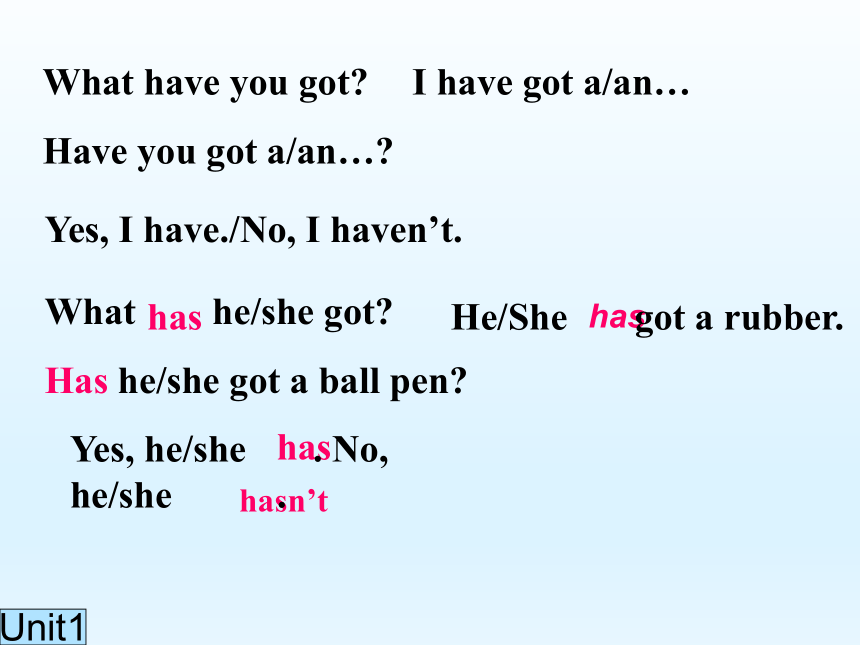
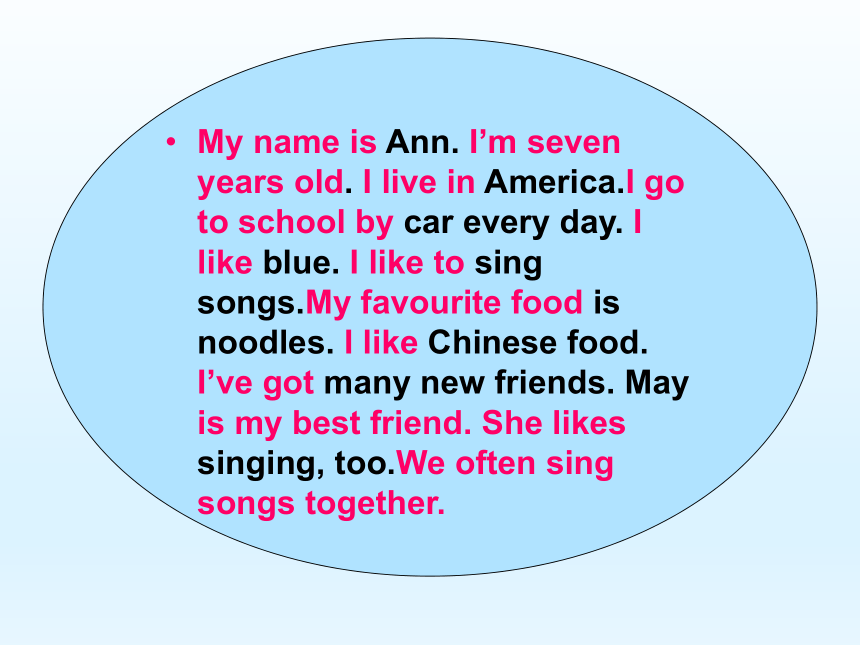

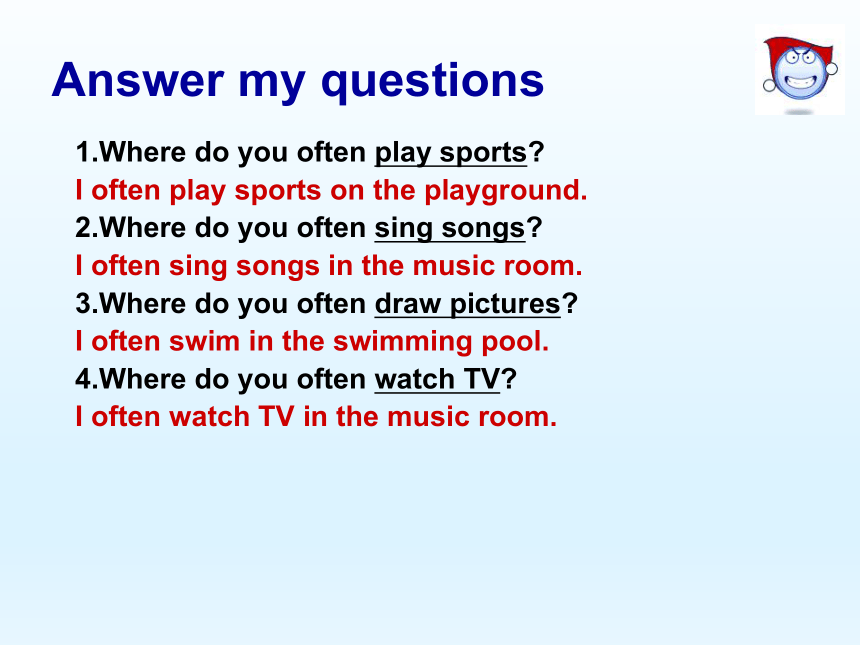
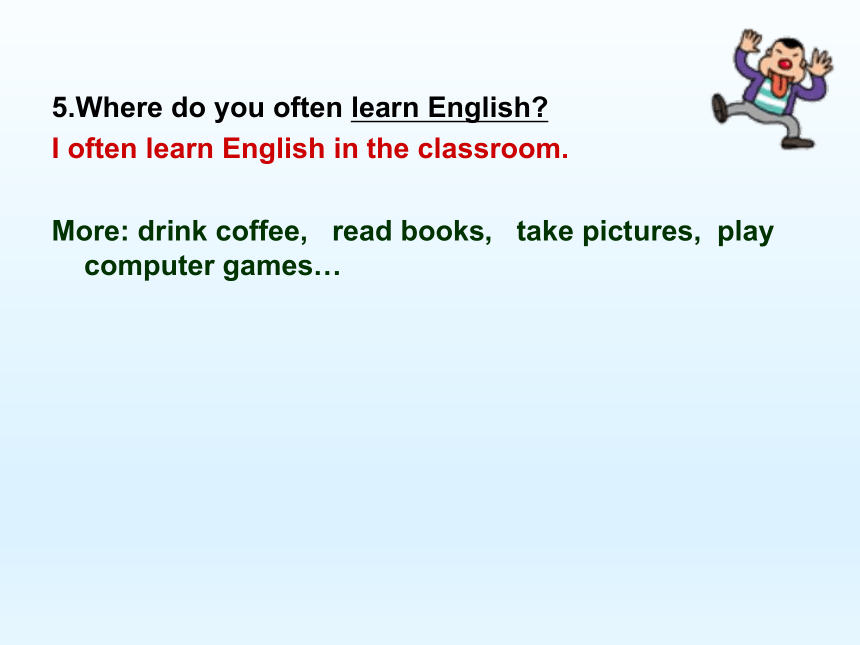
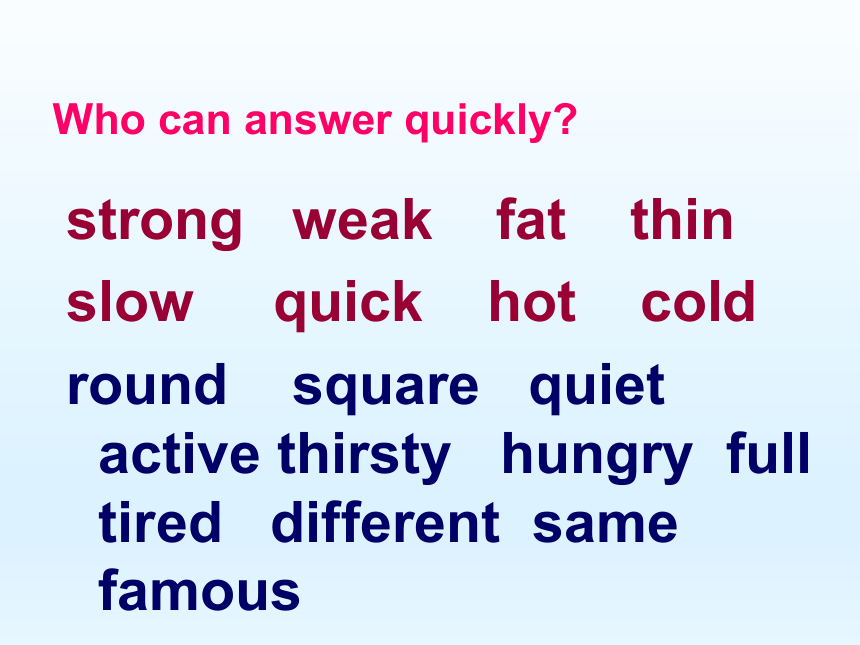
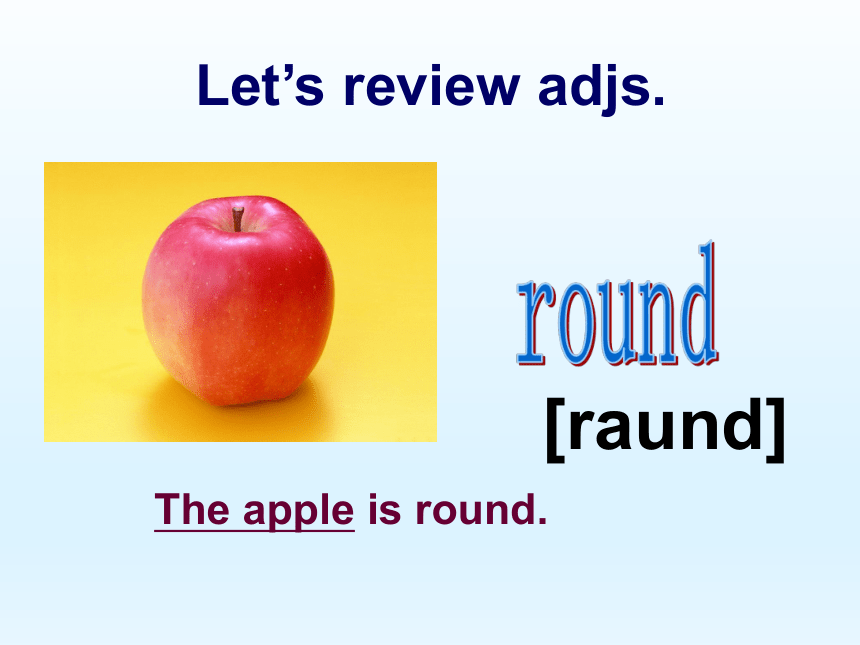
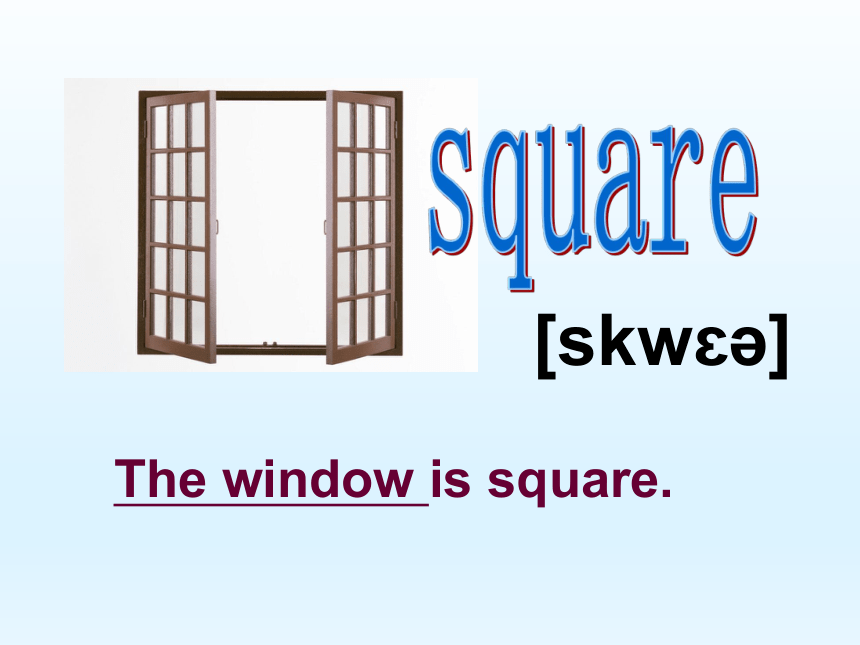

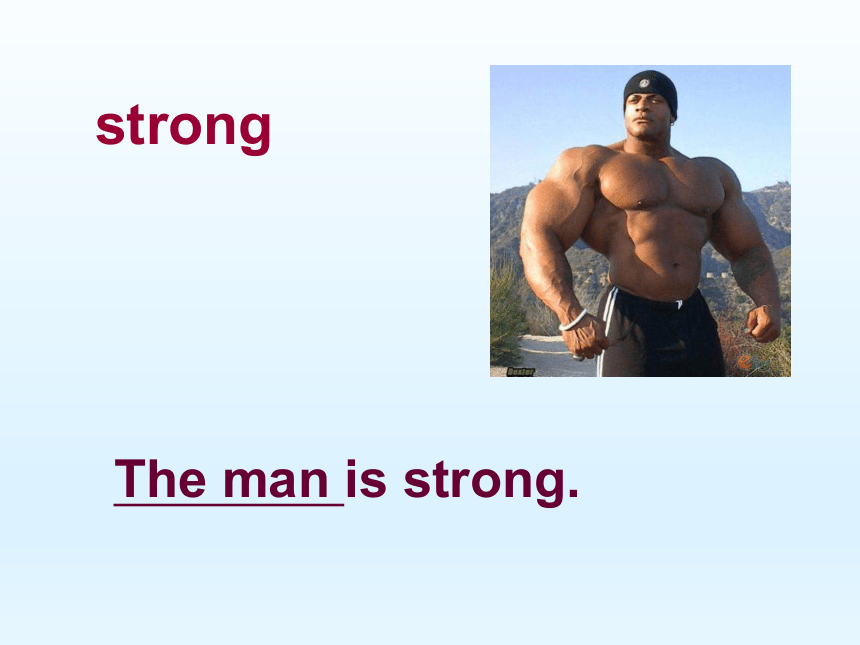
文档简介
课件103张PPT。
Unit4 Miss, can I ask you a question?China-Chinese
England- EnglishAmerica-AmericanWhat have you got?
Have you got a/an…?
What he/she got?
Has he/she got a ball pen?
has has has hasn’tI have got a/an…Yes, I have./No, I haven’t.He/She got a rubber.Yes, he/she . No, he/she .Unit1My name is Ann. I’m seven years old. I live in America.I go to school by car every day. I like blue. I like to sing songs.My favourite food is noodles. I like Chinese food. I’ve got many new friends. May is my best friend. She likes singing, too.We often sing songs together.It’s my robot.同义句
The robot is mine.mine Unit2itsyoursherourstheirsAnswer my questions1.Where do you often play sports?
I often play sports on the playground.
2.Where do you often sing songs?
I often sing songs in the music room.
3.Where do you often draw pictures?
I often swim in the swimming pool.
4.Where do you often watch TV?
I often watch TV in the music room.5.Where do you often learn English?
I often learn English in the classroom.
More: drink coffee, read books, take pictures, play computer games…strong weak fat thin
slow quick hot cold
round square quiet active thirsty hungry full tired different same famousWho can answer quickly?Let’s review adjs.roundThe apple is round.[raund] squareThe window is square.[skw??] quietThe night is quiet.[′kwai?t] strongThe man is strong.strongweakhungryThe girl is hungry.
She wants to eat rice.[′h??gri] thirstyThis boy is very thirsty.[′θ?:sti] tiredHe is very tired.′tai?d] differentThey are different.[′difr?nt] samefamousThe Great Wall is famous.coldhotThe girl ishot.The pig isfat.The clock issquare.The man istired.The monkey is sad.The rabbit is angry.The bear is thirsty.The cat is hungry.The watermelon is round.The Great Wall is famous.have classes.practise singing.draw pictureshave sports gamesbuy thingsdrink coffeetake out moneyhave suppersmell the flowers play soccerswimclassroommusic roomart room sports centreswimming pool shopcafé bankdinning roomgardenlibraryplayground read booksThis is a place where children can .I often read books in the libraryclassroom have classes.
music room ※practise singing.
art room draw pictures.
sports centre ※ ※have sports games.
swimming pool swim.
shop ※buy things.
café ※ drink coffee.
bank ※take out money.
dinning room have supper.
garden smell the flowers.
library ※ read books
playground play soccer
is a place where people can .Playgroundplay soccerDo you want to play a game?Guess riddles It’s round. You can see it in the evening in the sky. It’ long and green. Old people like it. It’s long and yellow.
Monkeys like to eat it. It’s orange. It’s long. Rabbits like to eat it. It’s white or brown. Many children like to eat it.This is the place where
children can have English class.language room[?l??ɡwid?] Miss ,can I ask a question?
[′kwest??n]
Sure! what is it?
[?u?]
What does this word mean?Line
/V/ [mi:n?]
5,word 7 ,on page 11./aI/sure meanline word pagequestionask[′kwest??n][?u?][mi:n] [ɑ:sk] [peid?] [lain] Art roomMiss ,what’s the Chinese for
“straight(curly) hair’’ ?
It's “Zhifa".Chinesestraightcurly[′k?:li] [streit] [′t?ai′ni:z] 8+42=
8-4=
7+5-3=
Guess ,which room is it?Maths roomMiss,what's the English for "jian“?
It's plus.
How about "jia“?
Minus! we say eight minus four is "four“.
Thank you!plushow aboutminus[pl?s] [′main?s] Dance roomWell done! /V/
Excuse me.Can I use the
/ju:/
bathroom for a minute?
/a:/ /I/ /I/
Yes,of course.Excuse me. Can I use the bathroom for a minute?
Excuse me通常在要打扰别人或要打断别人谈话或要吸引别人注意时使用。
e.g. Excuse me, Mr. Wang.
e.g.It’s orange. It’s long. Rabbits like to eat it.
答案:carrot
It’s round. You can see it in the evening in the sky.
答案:moon
It’s white or brown. Many children like to eat it.
答案:chocolate
It’s long and yellow. Monkeys like to eat it.
答案:banana
It’s long and green. Old people like it.
答案:bean Game roomWho can say a riddle?
/I/
Others find the picture
/V/
and put it on the wall.
/U/Can you have … ?Yes, I can.
NO, I can’t.Can he____________?
Yes, he can.bounce a ballCan she ____________?
No, she can’t.swimCan you ____________?
Yes, we can.go shopping Can(情态动词)的用法: 1. 既没有人称的变化,也没有数的变化.
2.句子的构成:
A.主语 +can +动词原形+其他.(肯定句)
例如: I can sing .
She can dance .
B.主语 + can’t +动词原形+其他.(否定句)
例如:I can’t sing .
C. Can + .主语 + 动词原形 +其他 ?(疑问句)
Yes ,主语 +can ./ No ,主语 + can’t .
例如: Can you sing ?
Yes , I can . / No , I can’t .改否定句(2) 直接在情态动词can后面加not.
You can play football .
You can not play football .
(2) 把情态动词can提到句首。
(must, may, can,could,need,…)
I can clean the window.
Can you clean the window?
改疑问句She can swim.
She can not(can’t)swim.
Can she swim?
Yes,she can.
No,she can not(can’t).以情态动词 (can, may ) 开头的一般疑问句。
1. Can you cook the meals?
No, _____ _____.
2. Can Chen Jie dive ?
Yes, ______ ______.
3. Can they play the piano?
Yes, ______ ______.
4. Can your brother use a computer?
No, _______ _______.
5 .May I have a look?
_____, ______ ______ ______(肯定)特殊疑问句 特殊疑问句:以疑问代词或疑问副词开头,提出疑问的句子。? 它的基本结构是:特殊疑问词+一般疑问句语序。但是如果疑问词在句子中作主语或作主语的定语,就用特殊疑问词+陈述句语序。常用的疑问词有:what,?who(whom),?whose,which,when,where,how,why等,回答时针对问句中的代词和副词来回答,不用yes或no来回答。? 3.Pair work. Can I…? 意为“我可以……吗?”
e.g.?Can I?see it?7.Read, write and check. (1)These books are in alphabetical order.
Write the missing letter on the books. 答案:b,e,h,l,p,s,u,w,z (2)Please look up these words in the dictionary and find out what they mean. Who wants to have a try!
Let me try.
What’s the English for“juanfa”?
e.g.What’s the Chinese for“cafe”?blanket[?bl??kit] bookcase[?b?k?ke?s ]scarf[skɑ:f]lizard[?l?z?d]?hall[h?:l] n.过道,走廊;大厅,前厅;娱乐中心,会所
复数:halls;blanket
bookcase
camera
clothes
scarf[?bl??kit] [?b?k?ke?s ][?k?m?r?]?n.照相机;摄影机 复数:cameras;[kl?uez] n.衣服,衣物;寝具
[skɑ:f]?[美][skɑrf]?n.围巾,领巾;?n.毛毯,毯子;毯?n.书橱,书架,复数:bookcases;lizard [?l?z?d]??n.蜥蜴复数:lizardsblanket
bookcase
camera
clothes
scarfhall
cupboard
hippo
kitchen
animaldoll
crocodile
comic
lizard
sharkWhat can you see on the blackboard?[?bl??kit] [h?:l] [d?l] [skɑ:f] [?hip?u] [kl?uez] [?l?z?d]?[?ɑ:k] [?k?b?d] [?k?m?r?] [?kr?k?dail] [?b?k?ke?s] 5.Read, check and learn. blanket
bookcase
camera
clothes
scarf
hall
cupboard
hippo
kitchen
animaldoll
crocodile
comic
lizard
sharkWhat does this word mean? Line3, word 2.How do you say this word?The Chinese for “hippo” is “he ma”.
OK, what’s the Chinese for “lizard”?
Then, what’s the English for “jia” ?6.Odd one out. (1)The third one is different. This is a nose. The others are hair.(2)The first one is different. The shoes are for us to wear. The others are for us to use.(3)The fourth one is different. The other three are classroom.
The fourth one is outside on the farm.(4)The third one is different. The others all have something in their hands,
but the third one has a boy.breadsandwichquestioncheesecomicvideotomatobalcony(3)Pronunciation: ①元音字母e在重读开音节中发 ,发 时舌尖抵下齿,舌前部向硬颚抬起,舌位在前元音里最高。双唇向两边张开成扁平形。
e.g.?she he we me
②元音字母e在非重读音节中发 ,发 时舌身平放,舌中部稍抬起,双唇扁平。
e.g.?problem student
2.Try it yourself. Make your own riddle and let your friend guess.
①What is the largest ant in the world?
答案:an elephant
②What becomes higher when the head is off?
答案:a pillow ③What is black when it is clean and white when it is dirty?
答案:blackboard
④What is more useful when it is broken?
答案:egg
⑤What room can no one enter?
答案:mushroom
⑥What am I if I drop into the water?
答案:waiter 1. can:
1) 表能力
We can speak English well now. 2) 表客观可能性(通常用否定)
The news can’t be true. 3) 表许可(与may 意思相近)
Can I have a try?
Can you open the door? 2. may :
1) 表示客气的请求
-- May I come in? --Come in, please.
-- May I borrow your pen, please? --Certainly!
-- May I have a piece of paper? --Of course. 3) 表示一件事或许会发生
I may be a teacher when I grow up.
What may happen?2) 表示许可
You may have a rest. 3.must :
1) 表必须要做的事
We must do everything step by step.
You mustn’t talk loudly in the library.
-- Must I clean the classroom now?
-- Yes , you must. / -- No , you needn’t.表肯定的猜测
This must be your room.
He must be asleep.
He can’t be awake now.用适当的情态动词填空:
I _______ go there on foot.
-- Can you ride a bike ? No, I ______.
-- ________ I go home now? -- No, you _____ stay here.
-- ______ I do the exercises today?
-- No, you ________. You _________ do them tomorrow.
5. The red light is on. We ________ stop. cancan’t Can/May must Must needn’t can/may must Multiple choice:I’m sorry I ___ finish my homework on time.
A. can’t B. mustn’t C. needn’t D. may
2. Must we finish our homework now?
No, you ___.
A. must B. needn’t C. can’t D. may not
3.Must I turn off the light now? --Yes, you__.
A. need B.should C. must D. may
4. He doesn’t come to school on time. He __ be ill.
A. can B. can’t C. must D. mustn’tABCC一般疑问句的复习 概念 : 简单地说,能用Yes / No(或相当于Yes / No)回答的疑问句叫一般疑问句。
结构:
be (情态动词、助动词)+主语+(名词、形容词、
副词、介词短语、动词原形等) +?
be: am are is were was
情态动词: can may
助动词: do does did
答语 :一般疑问句常用Yes或No回答.
其完整形式 :
肯定回答:
Yes,主语+be (情态动词、助动词)
否定回答:
No,主语+be (情态动词、助动词)+ not.
缩写 (n’t / ’t) (am not) 一 般 疑 问 句 的 复 习 一、根据问句作肯定回答或否定回答.
以be 动词(are, am, is, were, was)开头的一般疑问句。
1. Is Sarah sad today?
Yes, ______ ______.
2. Are you playing chess , John and Mike?
No, _____ _____ .
3. Is there a bookstore near the hospital?
No, ______ ______ .
4. Are there any pictures on the wall?
Yes, _______ ______. 5. Are you going to the cinema, Mary?
Yes, ______ ______.
6. Is it far from here?
Yes, ______ _____.
7. Are they having a picnic?
No, _______ ______ .
8.Were you busy yesterday, Amy?
Yes,______ _______.
9.Was she happy last Sunday?
Yes,______ _______. 以助动词(do, does, did) 开头的一般疑问句。
1.Do you watch TV in the evening?
Yes, ______ ______.
2.Did you go fishing last weekend?
No, ______ _______.
3.Do your parents work in a school?
Yes, _____ ______.
4.Did Amy visit her grandparents last weekend?
No, _____ _____.
5.Does she teach you English?
No, ______ ______.
6.Does it rain in spring?
Yes, ______ _____. 以情态动词 (can, may ) 开头的一般疑问句。
1. Can you cook the meals?
No, _____ _____.
2. Can Chen Jie dive ?
Yes, ______ ______.
3. Can they play the piano?
Yes, ______ ______.
4. Can your brother use a computer?
No, _______ _______.
5 .May I have a look?
_____, ______ ______ ______(肯定)二、根据答句写问句。
1. ___________________________________?
Yes, there is a bookstore next to the school.
2. ____________________________________?
Yes, there are some pandas in the mountains.
3. ____________________________________?
No, I am not a teacher.
4. ___________________________________?
Yes, Peter is stronger than me.
5. ____________________________________?
Yes, they are going to have a picnic.
6. ____________________________________?
No, Amy can’t sweep the floor.
7. ____________________________________?
Yes, I went to the cinema yesterday 8. ____________________________________?
Yes , I am helpful at home.
9. ____________________________________?
No, Tom didn’t buy any presents on his holiday.
10. ____________________________________?
Yes, my mother goes to work by car.
11. ___________________________________?
No, Mr. Li doesn’t work in a bank.
12. ____________________________________?
Yes, I can sing and dance.
13.____________________________________?
No, I don’t go to school by subway.
14._______________________________________________ ?
Yes , I was excited last weekend . 三、根据图片回答问题.1Are you watching TV?
_________________.
2.Is he short and strong?
___________________.
3.Can Sarah do the dishes?
__________________.
4.Do you go to school by bike?
__________________.
5.Does your mother work in the cinema?
____________________.
6.Are they going to take a trip?
____________________.
7.Did you go skiing on your holiday?
____________________.
8.Did John climb a mountain?
____________________. 口诀 :先找am, is, are, was, were或can放在最前面,
如没有则判断是否为过去式,是则动词改为原形,句前加Did,
不是过去式则判断是否为第三人称单数,是则动词改为原形,句前加Does,
不是第三人称单数,则句前加Do。Homework 句子本:
分别用be动词 (are, is),情态动词(can),助动词(do, does, did) 造问答句,用上肯定回答和否定回答。二.have/has的一般疑问句:1.)have 的一般疑问句:Do I have a round face ?/ Do you have a round face ?b. They have long hair and big eyes . (变一般疑问句)Do they have long hair and big eyes ?c. We have wide mouths and big noses . (变一般疑问句)Do we / you have mouths and big noses ?小结: have的一般疑问句是在句首加上助动词 ”Do” ,注意大小写的转换,其他的不变.(句中的 “I”可以变为” you”)
注意: “Do” 是加上去的,不是原句里面的。a. I have a round face .(变一般疑问句)2.)has 的一般疑问句:
a. He has a round face .(变一般疑问句)Does he have a round face ?b. She has long hair and big eyes . (变一般疑问句)Does she have long hair and big eyes ?c. Jane has a wide mouth and a big nose . (变一般疑问句)Does Jane have a wide mouth and a big nose ?小结: has的一般疑问句:第一步,是在句首加上助动词 ”Does” ,第二步,将句中的”has“变为”have“,注意大小写的转换,其他的不变.(句中的 “I”可以变为” you”)
注意: “Does” 是加上去的,不是原句里面的。三.将下列句子变为一般疑问句:1. Maria and Meimei have long hair and big eyes .
____________________________________________2. Li Lei has big eyes .
_________________________________________3. She has long hair .
___________________________________________4. I have a small nose .
___________________________________________5. That’s an English car .
_____________________________________________Do Maria and Meimei have long hair and big eyes ?Does Li Lei have big eyes ?Does she have big eyes ?Do you have a small nose ?Is that an English car ?6. They have big ears and small mouths .
_____________________________________________Do they have big ears and small mouths ?
England- EnglishAmerica-AmericanWhat have you got?
Have you got a/an…?
What he/she got?
Has he/she got a ball pen?
has has has hasn’tI have got a/an…Yes, I have./No, I haven’t.He/She got a rubber.Yes, he/she . No, he/she .Unit1My name is Ann. I’m seven years old. I live in America.I go to school by car every day. I like blue. I like to sing songs.My favourite food is noodles. I like Chinese food. I’ve got many new friends. May is my best friend. She likes singing, too.We often sing songs together.It’s my robot.同义句
The robot is mine.mine Unit2itsyoursherourstheirsAnswer my questions1.Where do you often play sports?
I often play sports on the playground.
2.Where do you often sing songs?
I often sing songs in the music room.
3.Where do you often draw pictures?
I often swim in the swimming pool.
4.Where do you often watch TV?
I often watch TV in the music room.5.Where do you often learn English?
I often learn English in the classroom.
More: drink coffee, read books, take pictures, play computer games…strong weak fat thin
slow quick hot cold
round square quiet active thirsty hungry full tired different same famousWho can answer quickly?Let’s review adjs.roundThe apple is round.[raund] squareThe window is square.[skw??] quietThe night is quiet.[′kwai?t] strongThe man is strong.strongweakhungryThe girl is hungry.
She wants to eat rice.[′h??gri] thirstyThis boy is very thirsty.[′θ?:sti] tiredHe is very tired.′tai?d] differentThey are different.[′difr?nt] samefamousThe Great Wall is famous.coldhotThe girl ishot.The pig isfat.The clock issquare.The man istired.The monkey is sad.The rabbit is angry.The bear is thirsty.The cat is hungry.The watermelon is round.The Great Wall is famous.have classes.practise singing.draw pictureshave sports gamesbuy thingsdrink coffeetake out moneyhave suppersmell the flowers play soccerswimclassroommusic roomart room sports centreswimming pool shopcafé bankdinning roomgardenlibraryplayground read booksThis is a place where children can .I often read books in the libraryclassroom have classes.
music room ※practise singing.
art room draw pictures.
sports centre ※ ※have sports games.
swimming pool swim.
shop ※buy things.
café ※ drink coffee.
bank ※take out money.
dinning room have supper.
garden smell the flowers.
library ※ read books
playground play soccer
is a place where people can .Playgroundplay soccerDo you want to play a game?Guess riddles It’s round. You can see it in the evening in the sky. It’ long and green. Old people like it. It’s long and yellow.
Monkeys like to eat it. It’s orange. It’s long. Rabbits like to eat it. It’s white or brown. Many children like to eat it.This is the place where
children can have English class.language room[?l??ɡwid?] Miss ,can I ask a question?
[′kwest??n]
Sure! what is it?
[?u?]
What does this word mean?Line
/V/ [mi:n?]
5,word 7 ,on page 11./aI/sure meanline word pagequestionask[′kwest??n][?u?][mi:n] [ɑ:sk] [peid?] [lain] Art roomMiss ,what’s the Chinese for
“straight(curly) hair’’ ?
It's “Zhifa".Chinesestraightcurly[′k?:li] [streit] [′t?ai′ni:z] 8+42=
8-4=
7+5-3=
Guess ,which room is it?Maths roomMiss,what's the English for "jian“?
It's plus.
How about "jia“?
Minus! we say eight minus four is "four“.
Thank you!plushow aboutminus[pl?s] [′main?s] Dance roomWell done! /V/
Excuse me.Can I use the
/ju:/
bathroom for a minute?
/a:/ /I/ /I/
Yes,of course.Excuse me. Can I use the bathroom for a minute?
Excuse me通常在要打扰别人或要打断别人谈话或要吸引别人注意时使用。
e.g. Excuse me, Mr. Wang.
e.g.It’s orange. It’s long. Rabbits like to eat it.
答案:carrot
It’s round. You can see it in the evening in the sky.
答案:moon
It’s white or brown. Many children like to eat it.
答案:chocolate
It’s long and yellow. Monkeys like to eat it.
答案:banana
It’s long and green. Old people like it.
答案:bean Game roomWho can say a riddle?
/I/
Others find the picture
/V/
and put it on the wall.
/U/Can you have … ?Yes, I can.
NO, I can’t.Can he____________?
Yes, he can.bounce a ballCan she ____________?
No, she can’t.swimCan you ____________?
Yes, we can.go shopping Can(情态动词)的用法: 1. 既没有人称的变化,也没有数的变化.
2.句子的构成:
A.主语 +can +动词原形+其他.(肯定句)
例如: I can sing .
She can dance .
B.主语 + can’t +动词原形+其他.(否定句)
例如:I can’t sing .
C. Can + .主语 + 动词原形 +其他 ?(疑问句)
Yes ,主语 +can ./ No ,主语 + can’t .
例如: Can you sing ?
Yes , I can . / No , I can’t .改否定句(2) 直接在情态动词can后面加not.
You can play football .
You can not play football .
(2) 把情态动词can提到句首。
(must, may, can,could,need,…)
I can clean the window.
Can you clean the window?
改疑问句She can swim.
She can not(can’t)swim.
Can she swim?
Yes,she can.
No,she can not(can’t).以情态动词 (can, may ) 开头的一般疑问句。
1. Can you cook the meals?
No, _____ _____.
2. Can Chen Jie dive ?
Yes, ______ ______.
3. Can they play the piano?
Yes, ______ ______.
4. Can your brother use a computer?
No, _______ _______.
5 .May I have a look?
_____, ______ ______ ______(肯定)特殊疑问句 特殊疑问句:以疑问代词或疑问副词开头,提出疑问的句子。? 它的基本结构是:特殊疑问词+一般疑问句语序。但是如果疑问词在句子中作主语或作主语的定语,就用特殊疑问词+陈述句语序。常用的疑问词有:what,?who(whom),?whose,which,when,where,how,why等,回答时针对问句中的代词和副词来回答,不用yes或no来回答。? 3.Pair work. Can I…? 意为“我可以……吗?”
e.g.?Can I?see it?7.Read, write and check. (1)These books are in alphabetical order.
Write the missing letter on the books. 答案:b,e,h,l,p,s,u,w,z (2)Please look up these words in the dictionary and find out what they mean. Who wants to have a try!
Let me try.
What’s the English for“juanfa”?
e.g.What’s the Chinese for“cafe”?blanket[?bl??kit] bookcase[?b?k?ke?s ]scarf[skɑ:f]lizard[?l?z?d]?hall[h?:l] n.过道,走廊;大厅,前厅;娱乐中心,会所
复数:halls;blanket
bookcase
camera
clothes
scarf[?bl??kit] [?b?k?ke?s ][?k?m?r?]?n.照相机;摄影机 复数:cameras;[kl?uez] n.衣服,衣物;寝具
[skɑ:f]?[美][skɑrf]?n.围巾,领巾;?n.毛毯,毯子;毯?n.书橱,书架,复数:bookcases;lizard [?l?z?d]??n.蜥蜴复数:lizardsblanket
bookcase
camera
clothes
scarfhall
cupboard
hippo
kitchen
animaldoll
crocodile
comic
lizard
sharkWhat can you see on the blackboard?[?bl??kit] [h?:l] [d?l] [skɑ:f] [?hip?u] [kl?uez] [?l?z?d]?[?ɑ:k] [?k?b?d] [?k?m?r?] [?kr?k?dail] [?b?k?ke?s] 5.Read, check and learn. blanket
bookcase
camera
clothes
scarf
hall
cupboard
hippo
kitchen
animaldoll
crocodile
comic
lizard
sharkWhat does this word mean? Line3, word 2.How do you say this word?The Chinese for “hippo” is “he ma”.
OK, what’s the Chinese for “lizard”?
Then, what’s the English for “jia” ?6.Odd one out. (1)The third one is different. This is a nose. The others are hair.(2)The first one is different. The shoes are for us to wear. The others are for us to use.(3)The fourth one is different. The other three are classroom.
The fourth one is outside on the farm.(4)The third one is different. The others all have something in their hands,
but the third one has a boy.breadsandwichquestioncheesecomicvideotomatobalcony(3)Pronunciation: ①元音字母e在重读开音节中发 ,发 时舌尖抵下齿,舌前部向硬颚抬起,舌位在前元音里最高。双唇向两边张开成扁平形。
e.g.?she he we me
②元音字母e在非重读音节中发 ,发 时舌身平放,舌中部稍抬起,双唇扁平。
e.g.?problem student
2.Try it yourself. Make your own riddle and let your friend guess.
①What is the largest ant in the world?
答案:an elephant
②What becomes higher when the head is off?
答案:a pillow ③What is black when it is clean and white when it is dirty?
答案:blackboard
④What is more useful when it is broken?
答案:egg
⑤What room can no one enter?
答案:mushroom
⑥What am I if I drop into the water?
答案:waiter 1. can:
1) 表能力
We can speak English well now. 2) 表客观可能性(通常用否定)
The news can’t be true. 3) 表许可(与may 意思相近)
Can I have a try?
Can you open the door? 2. may :
1) 表示客气的请求
-- May I come in? --Come in, please.
-- May I borrow your pen, please? --Certainly!
-- May I have a piece of paper? --Of course. 3) 表示一件事或许会发生
I may be a teacher when I grow up.
What may happen?2) 表示许可
You may have a rest. 3.must :
1) 表必须要做的事
We must do everything step by step.
You mustn’t talk loudly in the library.
-- Must I clean the classroom now?
-- Yes , you must. / -- No , you needn’t.表肯定的猜测
This must be your room.
He must be asleep.
He can’t be awake now.用适当的情态动词填空:
I _______ go there on foot.
-- Can you ride a bike ? No, I ______.
-- ________ I go home now? -- No, you _____ stay here.
-- ______ I do the exercises today?
-- No, you ________. You _________ do them tomorrow.
5. The red light is on. We ________ stop. cancan’t Can/May must Must needn’t can/may must Multiple choice:I’m sorry I ___ finish my homework on time.
A. can’t B. mustn’t C. needn’t D. may
2. Must we finish our homework now?
No, you ___.
A. must B. needn’t C. can’t D. may not
3.Must I turn off the light now? --Yes, you__.
A. need B.should C. must D. may
4. He doesn’t come to school on time. He __ be ill.
A. can B. can’t C. must D. mustn’tABCC一般疑问句的复习 概念 : 简单地说,能用Yes / No(或相当于Yes / No)回答的疑问句叫一般疑问句。
结构:
be (情态动词、助动词)+主语+(名词、形容词、
副词、介词短语、动词原形等) +?
be: am are is were was
情态动词: can may
助动词: do does did
答语 :一般疑问句常用Yes或No回答.
其完整形式 :
肯定回答:
Yes,主语+be (情态动词、助动词)
否定回答:
No,主语+be (情态动词、助动词)+ not.
缩写 (n’t / ’t) (am not) 一 般 疑 问 句 的 复 习 一、根据问句作肯定回答或否定回答.
以be 动词(are, am, is, were, was)开头的一般疑问句。
1. Is Sarah sad today?
Yes, ______ ______.
2. Are you playing chess , John and Mike?
No, _____ _____ .
3. Is there a bookstore near the hospital?
No, ______ ______ .
4. Are there any pictures on the wall?
Yes, _______ ______. 5. Are you going to the cinema, Mary?
Yes, ______ ______.
6. Is it far from here?
Yes, ______ _____.
7. Are they having a picnic?
No, _______ ______ .
8.Were you busy yesterday, Amy?
Yes,______ _______.
9.Was she happy last Sunday?
Yes,______ _______. 以助动词(do, does, did) 开头的一般疑问句。
1.Do you watch TV in the evening?
Yes, ______ ______.
2.Did you go fishing last weekend?
No, ______ _______.
3.Do your parents work in a school?
Yes, _____ ______.
4.Did Amy visit her grandparents last weekend?
No, _____ _____.
5.Does she teach you English?
No, ______ ______.
6.Does it rain in spring?
Yes, ______ _____. 以情态动词 (can, may ) 开头的一般疑问句。
1. Can you cook the meals?
No, _____ _____.
2. Can Chen Jie dive ?
Yes, ______ ______.
3. Can they play the piano?
Yes, ______ ______.
4. Can your brother use a computer?
No, _______ _______.
5 .May I have a look?
_____, ______ ______ ______(肯定)二、根据答句写问句。
1. ___________________________________?
Yes, there is a bookstore next to the school.
2. ____________________________________?
Yes, there are some pandas in the mountains.
3. ____________________________________?
No, I am not a teacher.
4. ___________________________________?
Yes, Peter is stronger than me.
5. ____________________________________?
Yes, they are going to have a picnic.
6. ____________________________________?
No, Amy can’t sweep the floor.
7. ____________________________________?
Yes, I went to the cinema yesterday 8. ____________________________________?
Yes , I am helpful at home.
9. ____________________________________?
No, Tom didn’t buy any presents on his holiday.
10. ____________________________________?
Yes, my mother goes to work by car.
11. ___________________________________?
No, Mr. Li doesn’t work in a bank.
12. ____________________________________?
Yes, I can sing and dance.
13.____________________________________?
No, I don’t go to school by subway.
14._______________________________________________ ?
Yes , I was excited last weekend . 三、根据图片回答问题.1Are you watching TV?
_________________.
2.Is he short and strong?
___________________.
3.Can Sarah do the dishes?
__________________.
4.Do you go to school by bike?
__________________.
5.Does your mother work in the cinema?
____________________.
6.Are they going to take a trip?
____________________.
7.Did you go skiing on your holiday?
____________________.
8.Did John climb a mountain?
____________________. 口诀 :先找am, is, are, was, were或can放在最前面,
如没有则判断是否为过去式,是则动词改为原形,句前加Did,
不是过去式则判断是否为第三人称单数,是则动词改为原形,句前加Does,
不是第三人称单数,则句前加Do。Homework 句子本:
分别用be动词 (are, is),情态动词(can),助动词(do, does, did) 造问答句,用上肯定回答和否定回答。二.have/has的一般疑问句:1.)have 的一般疑问句:Do I have a round face ?/ Do you have a round face ?b. They have long hair and big eyes . (变一般疑问句)Do they have long hair and big eyes ?c. We have wide mouths and big noses . (变一般疑问句)Do we / you have mouths and big noses ?小结: have的一般疑问句是在句首加上助动词 ”Do” ,注意大小写的转换,其他的不变.(句中的 “I”可以变为” you”)
注意: “Do” 是加上去的,不是原句里面的。a. I have a round face .(变一般疑问句)2.)has 的一般疑问句:
a. He has a round face .(变一般疑问句)Does he have a round face ?b. She has long hair and big eyes . (变一般疑问句)Does she have long hair and big eyes ?c. Jane has a wide mouth and a big nose . (变一般疑问句)Does Jane have a wide mouth and a big nose ?小结: has的一般疑问句:第一步,是在句首加上助动词 ”Does” ,第二步,将句中的”has“变为”have“,注意大小写的转换,其他的不变.(句中的 “I”可以变为” you”)
注意: “Does” 是加上去的,不是原句里面的。三.将下列句子变为一般疑问句:1. Maria and Meimei have long hair and big eyes .
____________________________________________2. Li Lei has big eyes .
_________________________________________3. She has long hair .
___________________________________________4. I have a small nose .
___________________________________________5. That’s an English car .
_____________________________________________Do Maria and Meimei have long hair and big eyes ?Does Li Lei have big eyes ?Does she have big eyes ?Do you have a small nose ?Is that an English car ?6. They have big ears and small mouths .
_____________________________________________Do they have big ears and small mouths ?
同课章节目录
- Unit 1 I‘ve got many new friends.
- Unit 2 Is this book yours?
- Unit 3 Our school is beautiful
- Unit 4 Miss, can I ask you a question?
- Unit 5 How about coming with us?
- Unit 6 He likes reading picture books.
- Unit 7 You mustn't drop litter in the park!
- Unit 8 Who is the winner?
- Unit 9 Sally is taller than Ben
- Unit 10 Did you know?
- Unit 11 I went to the zoo yesterday.
- Unit 12 Has your school got a swimming pool?
- Unit 13 My seven days
- Unit 14 How often does he have sports?
- Unit 15 Ienjoy reading picture staries!
- Unit 16 Winter fun
